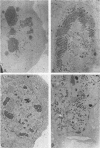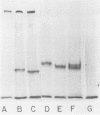Abstract
The properties of a naturally occurring temperature-sensitive (ts) mutant of human adenovirus type 7 (Ad7) were studied. Mutant Ad7 (19), or E46-, was the nonhybrid adenovirus component derived from the defective simian virus 40 (SV40)-Ad7 hybrid (PARA). Growth of the mutant was restricted at 40.5 degrees C, and the ratios of virus yields in KB cells at 40.5 and 33 degrees C were 10(-2) to 10(-3). Viral DNA synthesis and the synthesis of adenovirus-specific antigens (tumor, capsid, hexon, and penton antigens) appeared normal at the restrictive temperature. The assembly of virus particles was aberrant, as determined by thin-section of infected cells. The infectivity of mutant virions was heat labile at 50 degrees C, suggesting a ts defect in a structural component of the viron. Analysis by polyacrylamide gel electrophoresis of [35S]methionine-labeled polypeptides synthesized in mutant-infected cells suggested that at least the major virion polypeptides were synthesized at the restrictive temperature. A lack of inhibition of host protein synthesis late in mutant infections, as compared with wild-type (WT) infections at both the permissive and nonpermissive temperatures, made quantitation of infected-cell polypeptides difficult. Analysis of the assembly of capsomeres from cytoplasmic extracts of infected cells on sucrose gradients and by non-dissociating polyacrylamide gel electrophoresis suggested that hexon capsomeres were made at 40.5 degrees C. The hexon capsomeres made by the mutant at either 33 or 40.5 degrees C displayed a decreased migration in the non-dissociating gels compared with the WT hexon capsomeres. The molecular weights of the mutant and WT hexon polypeptides were identical. These results suggest that the ts lesion of this group B human Ad7 mutant may be reflected in altered hexons. The mutant Ad7 interfered with the replication of adenovirus types 2 and 21 at the elevated temperature.
Full text
PDF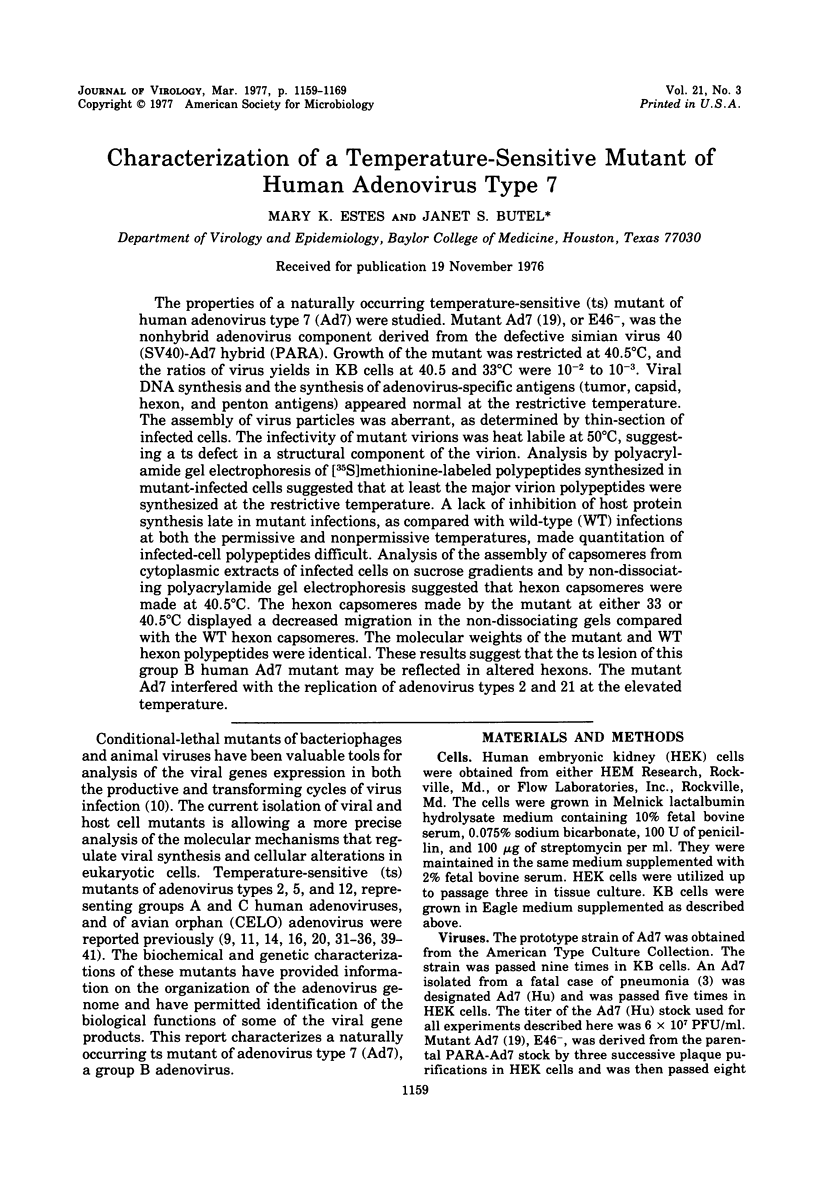

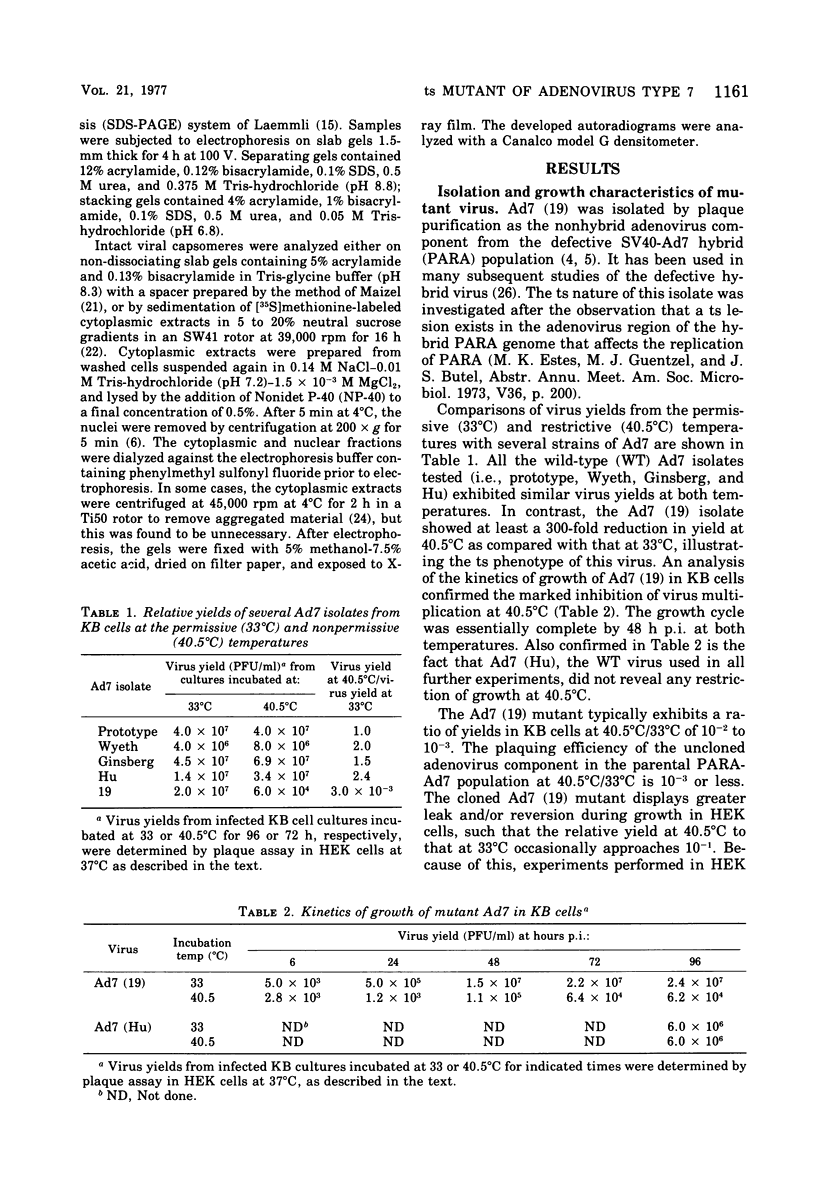


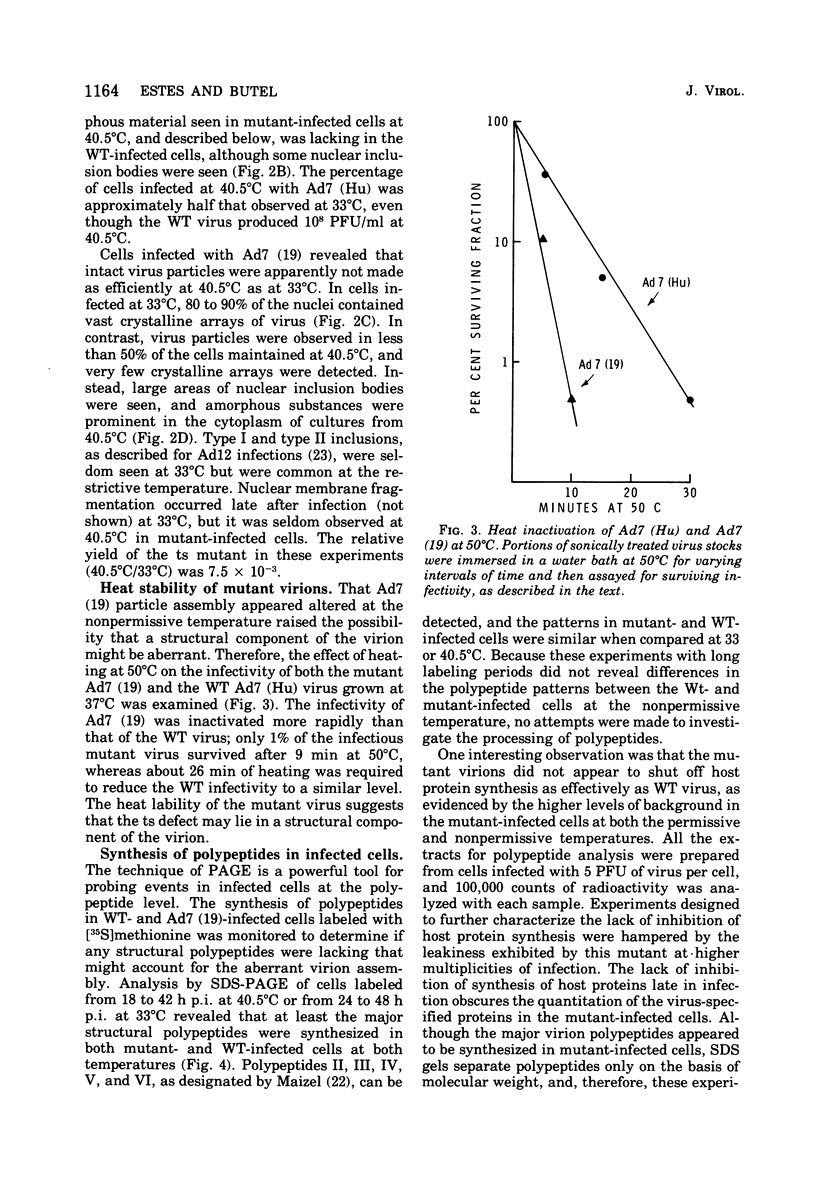
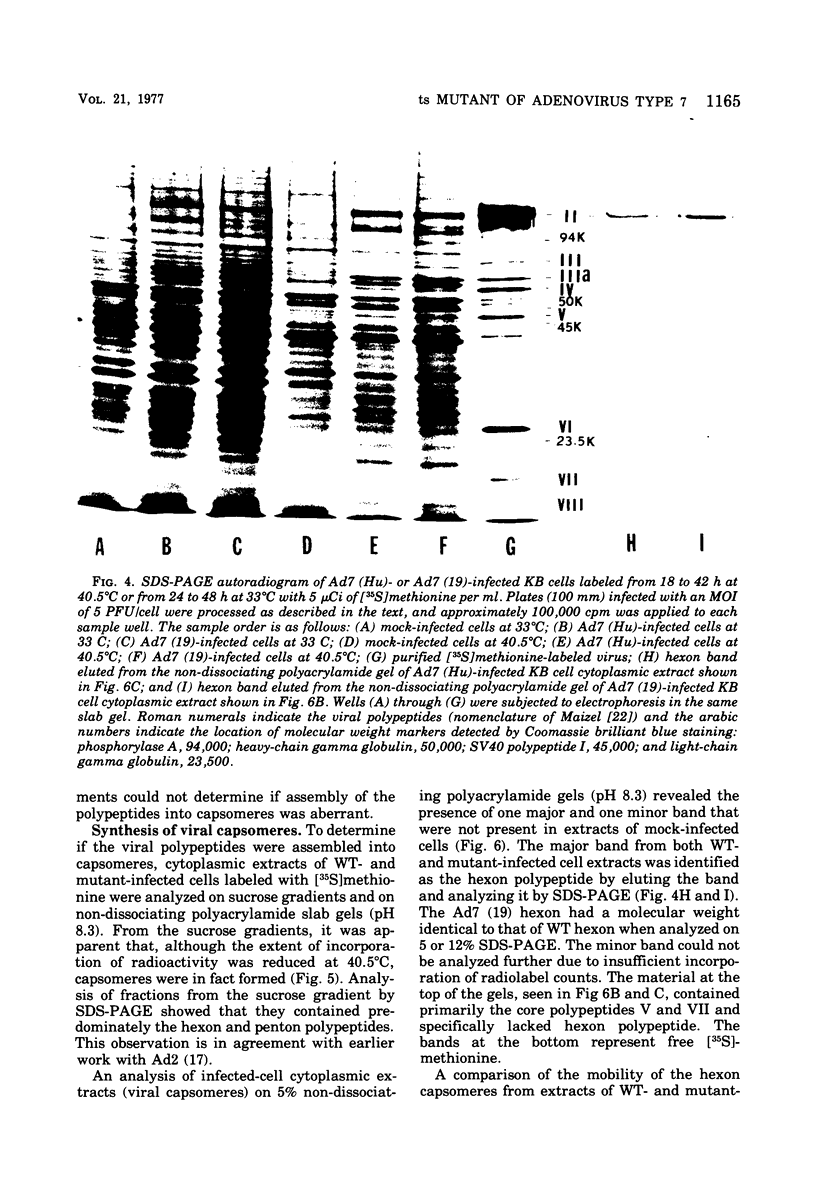
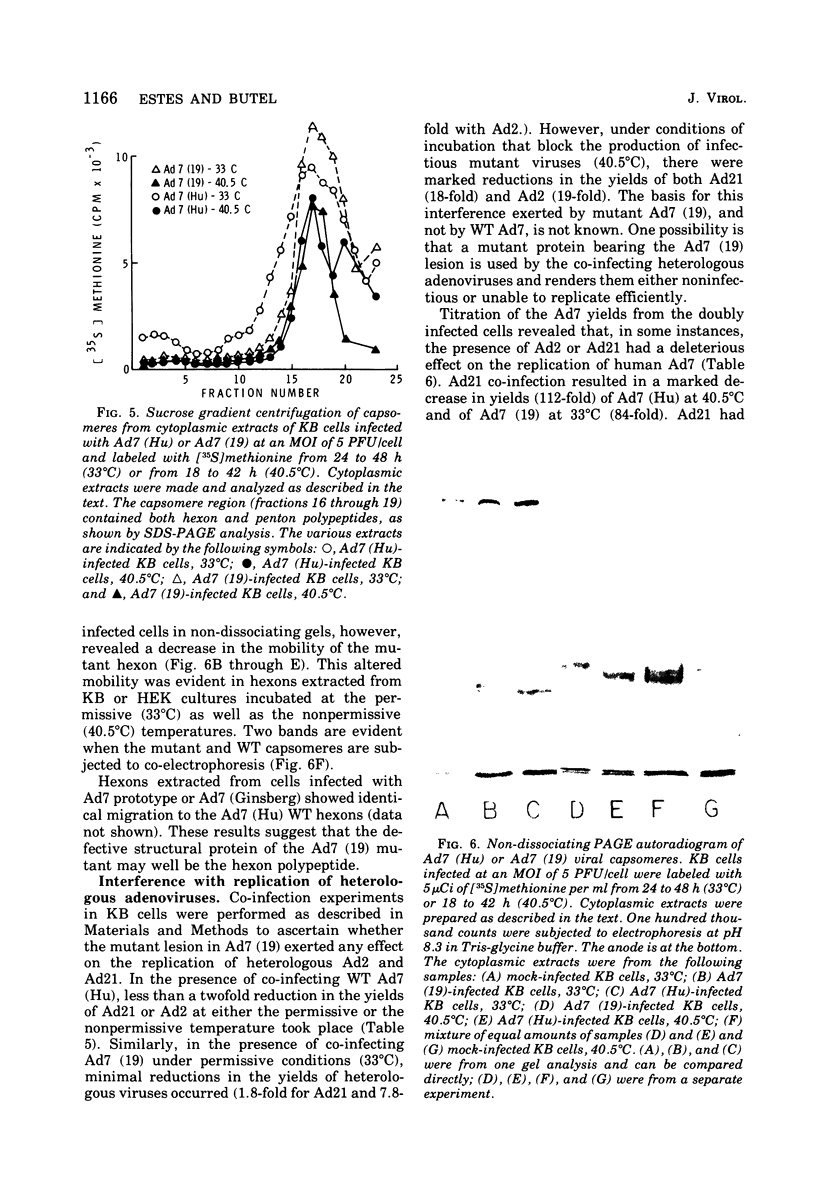
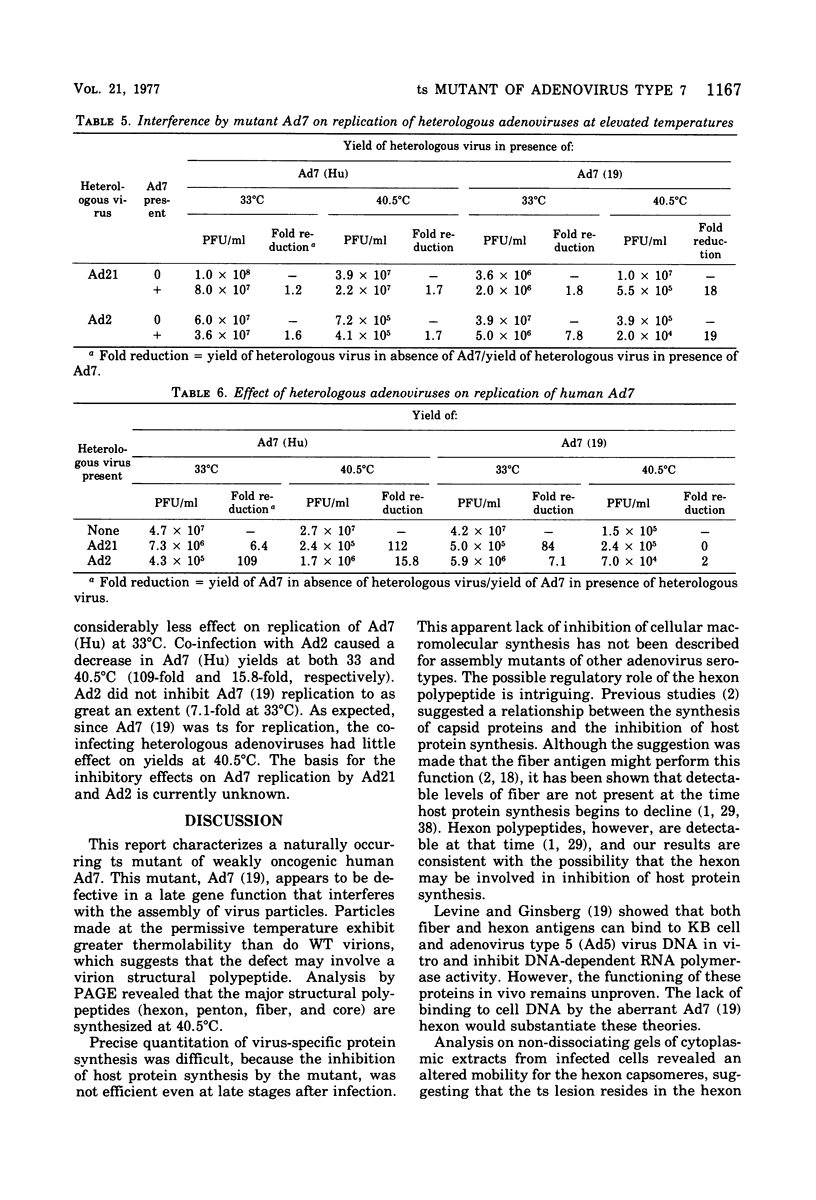

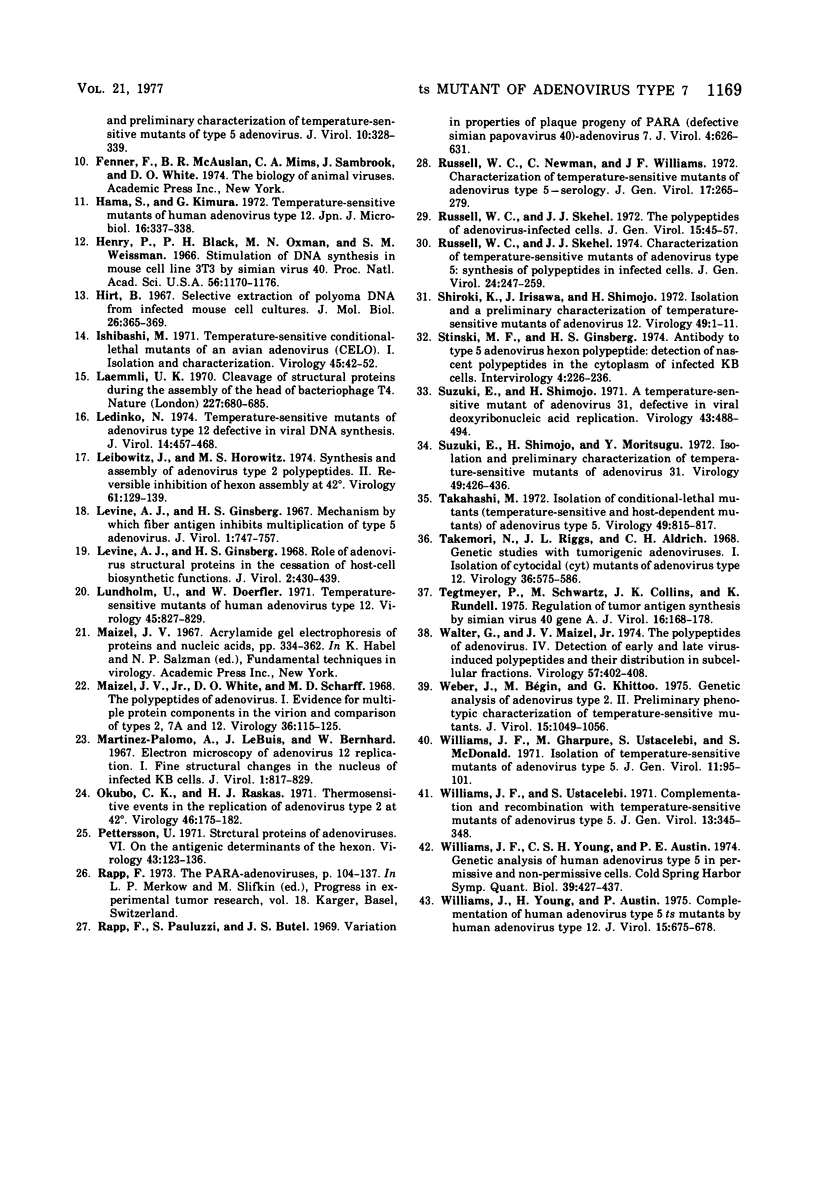
Images in this article
Selected References
These references are in PubMed. This may not be the complete list of references from this article.
- Anderson C. W., Baum P. R., Gesteland R. F. Processing of adenovirus 2-induced proteins. J Virol. 1973 Aug;12(2):241–252. doi: 10.1128/jvi.12.2.241-252.1973. [DOI] [PMC free article] [PubMed] [Google Scholar]
- BENYESH-MELNICK M., ROSENBERG H. S. THE ISOLATION OF ADENOVIRUS TYPE 7 FROM A FATAL CASE OF PNEUMONIA AND DISSEMINATED DISEASE. J Pediatr. 1964 Jan;64:83–87. doi: 10.1016/s0022-3476(64)80321-8. [DOI] [PubMed] [Google Scholar]
- BOEYE A., MELNICK J. L., RAPP F. ADENOVIRUS-SV40 "HYBRIDS": PLAQUE PURIFICATION INTO LINES IN WHICH THE DETERMINANT FOR THE SV40 TUMOR ANTIGEN IS LOST OR RETAINED. Virology. 1965 Jul;26:511–512. doi: 10.1016/0042-6822(65)90016-4. [DOI] [PubMed] [Google Scholar]
- Bello L. J., Ginsberg H. S. Inhibition of host protein synthesis in type 5 adenovirus-infected cells. J Virol. 1967 Oct;1(5):843–850. doi: 10.1128/jvi.1.5.843-850.1967. [DOI] [PMC free article] [PubMed] [Google Scholar]
- Boeyé A., Melnick J. L., Rapp F. SV40-adenovirus "hybrids": presence of two genotypes and the requirement of their complementation for viral replication. Virology. 1966 Jan;28(1):56–70. doi: 10.1016/0042-6822(66)90306-0. [DOI] [PubMed] [Google Scholar]
- Borun T. W., Scharff M. D., Robbins E. Preparation of mammalian polyribosomes with the detergent Nonidet P-40. Biochim Biophys Acta. 1967 Nov 21;149(1):302–304. doi: 10.1016/0005-2787(67)90715-0. [DOI] [PubMed] [Google Scholar]
- Butel J. S., Rapp F. Complementation between a defective monkey cell-adapting component and human adenoviruses in simian cells. Virology. 1967 Apr;31(4):573–584. doi: 10.1016/0042-6822(67)90185-7. [DOI] [PubMed] [Google Scholar]
- Butel J. S., Rapp F. Replication in simian cells of defective viruses in an SV40-adenovirus "hybrid" population. J Bacteriol. 1966 Jan;91(1):278–284. doi: 10.1128/jb.91.1.278-284.1966. [DOI] [PMC free article] [PubMed] [Google Scholar]
- Ensinger M. J., Ginsberg H. S. Selection and preliminary characterization of temperature-sensitive mutants of type 5 adenovirus. J Virol. 1972 Sep;10(3):328–339. doi: 10.1128/jvi.10.3.328-339.1972. [DOI] [PMC free article] [PubMed] [Google Scholar]
- Hama S., Kimura G. Temperature-sensitive mutants of human adenovirus type 12. Jpn J Microbiol. 1972 Jul;16(4):337–338. doi: 10.1111/j.1348-0421.1972.tb00667.x. [DOI] [PubMed] [Google Scholar]
- Henry P., Black P. H., Oxman M. N., Weissman S. M. Stimulation of DNA synthesis in mouse cell line 3T3 by Simian virus 40. Proc Natl Acad Sci U S A. 1966 Oct;56(4):1170–1176. doi: 10.1073/pnas.56.4.1170. [DOI] [PMC free article] [PubMed] [Google Scholar]
- Hirt B. Selective extraction of polyoma DNA from infected mouse cell cultures. J Mol Biol. 1967 Jun 14;26(2):365–369. doi: 10.1016/0022-2836(67)90307-5. [DOI] [PubMed] [Google Scholar]
- Ishibashi M. Temperature-sensitive conditional-lethal mutants of an avian adenovirus (CELO). I. Isolation and characterization. Virology. 1971 Jul;45(1):42–52. doi: 10.1016/0042-6822(71)90111-5. [DOI] [PubMed] [Google Scholar]
- Laemmli U. K. Cleavage of structural proteins during the assembly of the head of bacteriophage T4. Nature. 1970 Aug 15;227(5259):680–685. doi: 10.1038/227680a0. [DOI] [PubMed] [Google Scholar]
- Ledinko N. Temperature-sensitive mutants of adenovirus type 12 defective in viral DNA synthesis. J Virol. 1974 Sep;14(3):457–468. doi: 10.1128/jvi.14.3.457-468.1974. [DOI] [PMC free article] [PubMed] [Google Scholar]
- Leibowitz J., Horwitz M. S. Synthesis and assembly of adenovirus type 2 polypeptides. II. Reversible inhibition of hexon assembly at 42 degrees. Virology. 1974 Sep;61(1):129–139. doi: 10.1016/0042-6822(74)90248-7. [DOI] [PubMed] [Google Scholar]
- Levine A. J., Ginsberg H. S. Mechanism by which fiber antigen inhibits multiplication of type 5 adenovirus. J Virol. 1967 Aug;1(4):747–757. doi: 10.1128/jvi.1.4.747-757.1967. [DOI] [PMC free article] [PubMed] [Google Scholar]
- Levine A. J., Ginsberg H. S. Role of adenovirus structural proteins in the cessation of host-cell biosynthetic functions. J Virol. 1968 May;2(5):430–439. doi: 10.1128/jvi.2.5.430-439.1968. [DOI] [PMC free article] [PubMed] [Google Scholar]
- Lundholm U., Doerfler W. Temperature-sensitive mutants of human adenovirus type 12. Virology. 1971 Sep;45(3):827–829. doi: 10.1016/0042-6822(71)90206-6. [DOI] [PubMed] [Google Scholar]
- Maizel J. V., Jr, White D. O., Scharff M. D. The polypeptides of adenovirus. I. Evidence for multiple protein components in the virion and a comparison of types 2, 7A, and 12. Virology. 1968 Sep;36(1):115–125. doi: 10.1016/0042-6822(68)90121-9. [DOI] [PubMed] [Google Scholar]
- Martinez-Palomo A., Le Buis J., Bernhard W. Electron microscopy of adenovirus 12 replication. 1. Fine structural changes in the nucleus of infected KB cells. J Virol. 1967 Aug;1(4):817–829. doi: 10.1128/jvi.1.4.817-829.1967. [DOI] [PMC free article] [PubMed] [Google Scholar]
- Okubo C. K., Raskas H. J. Thermosensitive events in the replication of adenovirus type 2 at 42 degrees. Virology. 1971 Nov;46(2):175–182. doi: 10.1016/0042-6822(71)90020-1. [DOI] [PubMed] [Google Scholar]
- Pettersson U. Structural proteins of adenoviruses. VI. On the antigenic determinants of the hexon. Virology. 1971 Jan;43(1):123–136. doi: 10.1016/0042-6822(71)90230-3. [DOI] [PubMed] [Google Scholar]
- Rapp F., Pauluzzi S., Butel J. S. Variation in properties of plaque progeny of PARA (defective simian papovavirus 40)-adenovirus 7. J Virol. 1969 Nov;4(5):626–631. doi: 10.1128/jvi.4.5.626-631.1969. [DOI] [PMC free article] [PubMed] [Google Scholar]
- Rapp F. The PARA-adenoviruses. Prog Exp Tumor Res. 1973;18:104–137. [PubMed] [Google Scholar]
- Russel W. C., Newman C., Williams J. F. Characterization of temperature-sensitive mutants of adenovirus type 5--serology. J Gen Virol. 1972 Dec;17(3):265–279. doi: 10.1099/0022-1317-17-3-265. [DOI] [PubMed] [Google Scholar]
- Russell W. C., Skehel J. J. The polypeptides of adenovirus-infected cells. J Gen Virol. 1972 Apr;15(1):45–57. doi: 10.1099/0022-1317-15-1-45. [DOI] [PubMed] [Google Scholar]
- Russell W. C., Skehel J. J., Williams J. F. Characterization of temperature-sensitive mutants of adenovirus type 5: synthesis of polypeptides in infected cells. J Gen Virol. 1974 Aug;24(2):247–259. doi: 10.1099/0022-1317-24-2-247. [DOI] [PubMed] [Google Scholar]
- Shiroki K., Irisawa J., Shimojo H. Isolation and a preliminary characterization of temperature-sensitive mutants of adenovirus 12. Virology. 1972 Jul;49(1):1–11. doi: 10.1016/s0042-6822(72)80002-3. [DOI] [PubMed] [Google Scholar]
- Stinski M. F., Ginsberg H. S. Antibody to the type 5 adenovirus hexon polypeptide: detection of nascent polypeptides in the cytoplasm of infected KB cells. Intervirology. 1974;4(4):226–236. doi: 10.1159/000149967. [DOI] [PubMed] [Google Scholar]
- Suzuki E., Shimojo H. A temperature-sensitive mutant of adenovirus 31, defective in viral deoxyribonucleic acid replication. Virology. 1971 Feb;43(2):488–494. doi: 10.1016/0042-6822(71)90320-5. [DOI] [PubMed] [Google Scholar]
- Suzuki E., Shimojo H., Moritsugu Y. Isolation and a preliminary characterization of temperature-sensitive mutants of adenovirus 31. Virology. 1972 Aug;49(2):426–438. doi: 10.1016/0042-6822(72)90495-3. [DOI] [PubMed] [Google Scholar]
- Takahashi M. Isolation of conditional lethal mutants (temperature sensitive and host-dependent mutants) of adenovirus type 5. Virology. 1972 Sep;49(3):815–817. doi: 10.1016/0042-6822(72)90540-5. [DOI] [PubMed] [Google Scholar]
- Takemori N., Riggs J. L., Aldrich C. Genetic studies with tumorigenic adenoviruses. I. Isolation of cytocidal (cyt) mutants of adenovirus type 12. Virology. 1968 Dec;36(4):575–586. doi: 10.1016/0042-6822(68)90189-x. [DOI] [PubMed] [Google Scholar]
- Tegtmeyer P., Schwartz M., Collins J. K., Rundell K. Regulation of tumor antigen synthesis by simain virus 40 gene A. J Virol. 1975 Jul;16(1):168–178. doi: 10.1128/jvi.16.1.168-178.1975. [DOI] [PMC free article] [PubMed] [Google Scholar]
- Walter G., Maizel J. V., Jr The polypeptides of adenovirus. IV. Detection of early and late virus-induced polypeptides and their distribution in subcellular fractions. Virology. 1974 Feb;57(2):402–408. doi: 10.1016/0042-6822(74)90180-9. [DOI] [PubMed] [Google Scholar]
- Weber J., Begin M., Khittoo G. Genetic Analysis of Adenovirus Type 2 II. Preliminary Phenotypic Characterization of Temperature-Sensitive Mutants. J Virol. 1975 May;15(5):1049–1056. doi: 10.1128/jvi.15.5.1049-1056.1975. [DOI] [PMC free article] [PubMed] [Google Scholar]
- Williams J. F., Gharpure M., Ustacelebi S., McDonald S. Isolation of temperature-sensitive mutants of adenovirus type 5. J Gen Virol. 1971 May;11(2):95–101. doi: 10.1099/0022-1317-11-2-95. [DOI] [PubMed] [Google Scholar]
- Williams J. F., Ustacelebi S. Complementation and recombination with temperature-sensitive mutants of adenovirus type 5. J Gen Virol. 1971 Nov;13(2):345–348. doi: 10.1099/0022-1317-13-2-345. [DOI] [PubMed] [Google Scholar]
- Williams J., Young H., Austin P. Complementation of human adenovirus type 5 ts mutants by human adenovirus type 12. J Virol. 1975 Mar;15(3):675–678. doi: 10.1128/jvi.15.3.675-678.1975. [DOI] [PMC free article] [PubMed] [Google Scholar]
- Willians J. F., Young C. S., Austin P. E. Genetic analysis of human adenovirus type 5 in permissive and nonpermissive cells. Cold Spring Harb Symp Quant Biol. 1975;39(Pt 1):427–437. doi: 10.1101/sqb.1974.039.01.055. [DOI] [PubMed] [Google Scholar]




